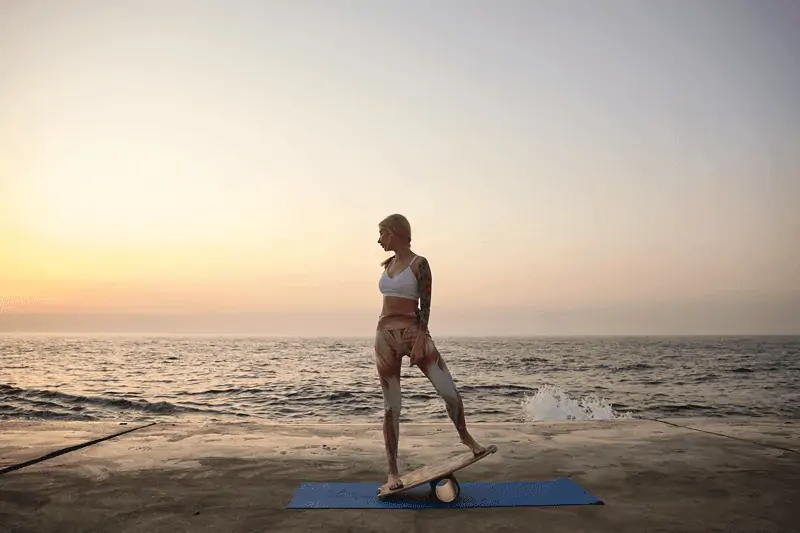Balance boards are a great way to train yourself for SUP.
Some people might think that using a balance board is just another one of those gimmicks, but it’s not.
In fact, many professional surfers use balance boards as part of their training regimen because they’re so effective at strengthening your core and groin muscles.
When you stand on the board and try to focus on balancing, your body will have to work hard in order to maintain equilibrium.
This strengthens the muscles that support your hip joints and pelvis which prevents injury while paddling long distances or surfing big waves.
Basically, if you want to be able to paddle all day without getting tired or sore then this is an essential piece of equipment that can help turn you into an even
[ez-toc]

Do balance boards help SUP?
Yes, they do.
A balance board can increase your SUP performance because it helps you focus on your balance.
For example, if you are good at balancing without the board then that only means that you are good at standing still on flat ground.
However, if you are using a balance board then you will use muscles that help stabilize your core and pelvic region which is essential for paddling long distances or surfing big waves.
So yes, they do improve SUP performance.
What do you do with a balance board?
There are a few different ways that you can use a balance board.
The first is to just stand on the board and focus on balancing.
This will help to strengthen the muscles that support your hip joints and pelvis.
The second way is to do some basic exercises on the balance board.
For example, you can do squats, lunges, or even push-ups.
These exercises will help to tone your body and increase your overall strength.
The third way is to use the balance board as part of your warm-up routine.
Before you paddle out, spend 10-15 minutes on the balance board in order to warm up your muscles and prepare them for SUP.
BALANCE TRAINING FOR SUP
Balance boards are an essential piece of equipment for SUPers who want to improve their balance and overall performance.
Not only do they help you focus on your balance, but they also help to strengthen the muscles that support your hip joints and pelvis.
In addition, balance boards can be used in a variety of different ways – stand on them and focus on balancing, do basic exercises, or use them as part of your warm-up routine.
So if you’re looking to take your SUP skills to the next level, then I highly recommend using a balance board as part of your training regimen.
You won’t regret it!
Revbalance Swell 2.0 – Surf & Paddle Balance Board Trainer
The Swell 2.0 is the next generation in balance training, engineered to keep you on your feet, wherever you are!
Designed by experts for surfers and stand-up paddlers, the revolutionary design combines premium materials with a natural rocker shape to create a perfect balance board for SUP training.
STAY READY FOR ANYTHING THE WATER THROWS AT YOU:
The all-new Revolution Swell 2.0 Balance Board is designed to prepare you for moments out on the water that requires your entire body to be working in unison.
Surfers, Paddle Boarders (SUP Balance boards are an essential piece of equipment for SUPers who want to improve their balance and overall performance.
balance boards can be used in a variety of different ways – stand on them and focus on balancing, do basic exercises, or use them as part of your warm-up routine.
so if you’re looking to take your SUP skills to the next level, then I highly recommend using a balance board as part of your training regimen.
You won’t regret it!
For more information click here.
Does a balance board have stoppers?
Falling in the water is way better than falling on your living room floor.
That is why balance boards come with stoppers, to stop it from flying out from under you while you are trying to stand on it.
There are a few different types of balance boards and each one comes with its own unique set of features.
Generally, the more expensive the balance board, the more features it will have.
However, all balance boards come with some type of stopper system so that you don’t fall off while you are trying to balance.
So if you’re looking for a balance board, make sure to find one that has a good stopper system. It will save you from a lot of pain!
What is the difference between a balance board and a wobble board?
A wobble board is a round or octagon board shape that sits on top of a small and hard half-dome base.
A balance board looks sort of like a skateboard deck that balances on top of a cylinder.
The key difference between a balance board and a wobble board is that a wobble board is not as stable as a balance board.
This means that it is more difficult to stay balanced on a wobble board, which makes it ideal for training your balance skills.
A balance board, on the other hand, is much more stable and therefore is better for training your overall strength and stability.
However, not all balance boards come with the same type of stopper system.
So if you’re looking for a good way to improve your balance skills, then look for one that has an effective and easy-to-use stopper system.
You don’t want your training session to be ruined because you can’t keep yourself upright on the board!
Final Thoughts
Balance boards can be used in a variety of ways.
Whether you’re looking to take your SUP skills to the next level, or if you want to improve your balance and overall performance while surfing stand-up paddling (SUP), or other activities on the water.
They are an essential piece of equipment for any athlete who wants to perform at their best without injury.
The Revbalance Swell 2.0 is engineered with premium materials that will provide stability no matter what type of surface area it’s standing on!
It’s one of the best balance boards for SUP training right now.
It also comes equipped with stoppers so there’s no chance you’ll fall off during training sessions – which means less time injured and more time improving your abilities out on the water.
